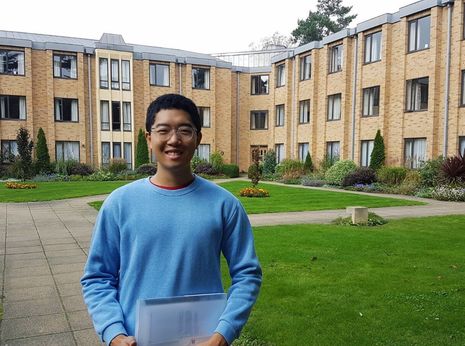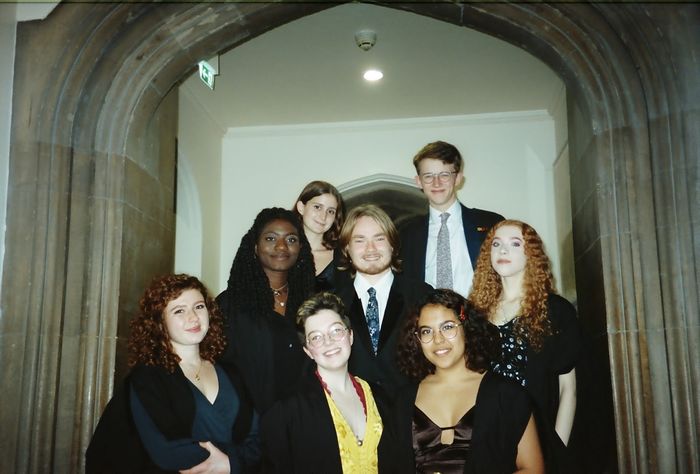Cambridge is in the Heart (Part I)
In this two-part piece, Jonathan Chan evokes the many contradictions that have defined his time at Cambridge.
I awoke from an Anglophile’s fever dream.
On the 18th of March, I said my final goodbyes to open fields, cobblestone roads and grassy courts. I had a tepid train ride to Heathrow, mask pulled thin across my face, wary of the people seated in my vicinity. Reports of racial violence turned over in my head – I was afraid that the quiet of my journey would be ruptured.
The week had left me too frazzled to fully process the swiftness of the change, too disengaged to bid a proper farewell to a place riddled with contradiction, at once bolstered and bogged down by tradition. Its stubbornness had begun to feel like an unnerving complacency.
***
“Here are the dreams that nestle in the heart, suffused in the ether of an ancient institution.”
‘The unique thing about a place like Cambridge is the capacity to be surprised every day.’ This was the coda that had resounded within me from my earliest days as a student. It was a sentiment exchanged over pints in the Wolfson bar, midway through freshers’ week. I was trying to come to grips with a place that wore its prestige so loosely, so easily, blithe to the fact that its name adorns the examination certifications of thousands of kids across the world. Maybe I came in too combative, too eager to contest strictures I hadn’t yet understood. ‘It is best not to be too ostentatiously facile’, another friend said. ‘Yes, yes,’ I conceded and drained my pint of lager.
***
Aspiration is embedded by repetition – here is your gown, here are the spires and chapels, this is your faculty, this is your formal hall. These are the curios now handed to you.
Here are the dreams that nestle in the heart, suffused in the ether of an ancient institution.
***
‘The name will follow you for life’, my dad had argued when I was deciding where to study. ’If you say you’re from Cambridge people will go ‘ooh’.’ I didn’t want to let that govern my decisions. That people perk up when I’ve mentioned that name has been true, even if my attendance has often felt aleatory, unmoored. Maybe it has contributed to my feeling of being estranged from being a ‘Cambridge student’, which I once was, but suppose am not anymore.
***
My maternal grandmother in Seoul once said, ‘Now that I have one grandchild in Cambridge, I would like to have one in Harvard and one in Stanford.’ My matriculation portrait rested on her dresser. I shifted uncomfortably at that prospect: university acceptances collected like trophies.
"At the end of every term, my prayers remained the same: ‘Thank you God’ and ‘What next?’"
My paternal grandmother teared up when she came to visit. She last visited Cambridge over 40 years ago from Kuala Lumpur. As we walked through the courts of Wolfson we took photos in front of the plodge. I showed her the bits of college that had become quotidian– staircase, club room, dining hall, library. She spoke:
‘Your Yeh Yeh would have been so proud of you.’
Mah Mah grew up in colonial Malaya, so her English is crisp and clipped. Halmoni grew up in colonial Korea, so her English is paltry. The Japanese did not allow them to learn it. It was the tongue of the enemy, after all.
***
Very few people can leave Cambridge saying that they’ve had few regrets, even more so when they’ve been evicted. I’m lucky that I’ve scratched most things off my bucket list. Rowing, theatre, writing for this newspaper – they came and went by second year. Every Friday, I would go for bible study with my cell group, and every Sunday I would go to church. In that sanctuary, I would pray for a dissolution of those external identities. At the end of every term, my prayers remained the same: ‘Thank you God’ and ‘What next?’
***
I used to fear that Cambridge would make me selfish. When I first arrived, the line between a self-directed and self-centered life seemed thin. Most of my years preceding university were spent embedded in groups to which I held myself accountable. Family, church, platoon, classroom. Those ties were jettisoned by distance. Texts and Instagram posts were no substitute for physical accompaniment. Relationships could not be disembodied. I traded these worries with a friend on a walk through Jesus College. The outcome of that conversation remains hazy in my memory, but there must have been something that clicked. My schedule began to fill with coffees and dinners. How much of my investing in others was a divesting from those anxieties?
"At one point my face flowed into my eyebags."
At one point my face flowed into my eyebags. I could see the folds deepen each time I looked in the mirror. It was in Lent of second year when everything seemed to coincide. Caffeine became a necessity. My eyes began to twitch. My days became constellations of essays, rehearsals, outings, meetings, and my sleep cycle began to suffer. I fell sick after returning from the boathouse drenched by bad technique. I messaged a friend telling him my symptoms, feeling that I was falling sick. ‘You’re already sick’, he replied. My mom told me to drink less coffee and get more rest, a lesson hard learned.
***
The most Cambridge person I’ve ever seen was a course mate who wore round spectacles, peak caps, corduroy pants, and a tie and sweater every single day. I once saw him cycle past on the way home to Wolfson and thought ‘that is the most Cambridge man I’ve ever seen in my life.’ The most Cambridge teaching I’ve had was at a supervisor’s porch in Robinson. Maybe it was a veranda. We were encased by tall glass windows that overlooked the college’s gardens. We traded insights about Shakespeare plays we’d hastily skimmed the week before. His eyes would light up as twin columns of smoke swirled from his nostrils. Vaping injected a contemporary sensibility.
***
I read the open letter calling for the decolonisation of the English Tripos the summer before I arrived. That had switched me on to inchoate thinking about what it all meant. In Singapore, we grew up ensconced in an atmosphere of coloniality. Michelle K. worded its antithesis well. It wasn’t until I showed up that I began to grasp the strangeness of the postcolonial situation, folding my tongue over Middle English syllables. In Singapore, a proximity to coloniality is a proximity to privilege: articulacy in the English language, acquaintance with the ‘cultural capital’ of America and Europe, the social savvy that underpins business savvy. In Singapore, a proximity to Cambridge is a proximity to Singaporean politics. Just under a third of the cabinet went to Cambridge.
***
The English Faculty in Cambridge is sluggish and self-congratulatory. The demands of the Decolonise English campaign have been cursorily acknowledged and largely elided. Strange considering the postcolonial paper was chosen by 30% of the cohort and managed by 2 full-time academics. I have sometimes wondered why the university is trying to improve access for BME students and content to leave its teaching as regressive as it has been. ‘Decolonisation’ is a term from the second half of the 20th century. Some people argue that is where the Faculty remains.
The slowness of the English Faculty’s bureaucracy should have been a warning of what was to come.

***
dad stands at the gates of wolfson college
someday you will know
what it means to walk these
hallowed grounds, even as
you scoff at me and those who
think them so. i was here when
a woman was in power, and so it
is with you. someday you will see
the pride this brings to those who
loved you into being, tears shed by
those who are here and for those
who are not. someday you will learn
that we take the best we can get because
life isn’t fair and neither are the people
who make it so. someday you will find
how the luster will not diminish to others,
even if it does for you. and if, touch wood,
it is all swept from under your feet, i hope
you will not let its stories recede, gowns,
spires, and all, for the sake of those you
love: here, there, and everywhere.
 Comment / College rivalry should not become college snobbery30 January 2026
Comment / College rivalry should not become college snobbery30 January 2026 News / Downing Bar dodges college takeover31 January 2026
News / Downing Bar dodges college takeover31 January 2026 News / Cambridge for Palestine hosts sit-in at Sidgwick demanding divestment31 January 2026
News / Cambridge for Palestine hosts sit-in at Sidgwick demanding divestment31 January 2026 Science / Meet the Cambridge physicist who advocates for the humanities30 January 2026
Science / Meet the Cambridge physicist who advocates for the humanities30 January 2026 Features / Are you more yourself at Cambridge or away from it? 27 January 2026
Features / Are you more yourself at Cambridge or away from it? 27 January 2026









